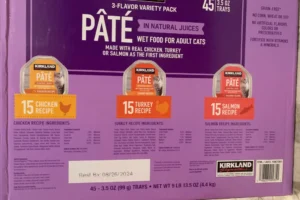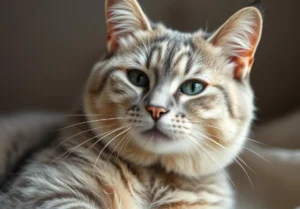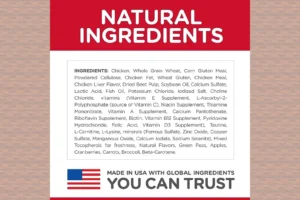Disclosure: We may earn a commission from helpful, relevant links in our content. No cost to you. See our privacy policy.
Your feline friend, all curled up and purring, seems content. But did you ever wonder what fuels that contentment and vitality? In a word, it’s protein.
The importance of protein in your cat’s diet cannot be overstated; it’s a lifeline for their health, well-being, and overall life quality. But how much do you really know about it? Like how much protein should they be getting? What specific proteins are necessary?
Join us as we embark on a journey of discovery, from the vital role of protein in a cat’s diet to making sense of commercial cat food labels.
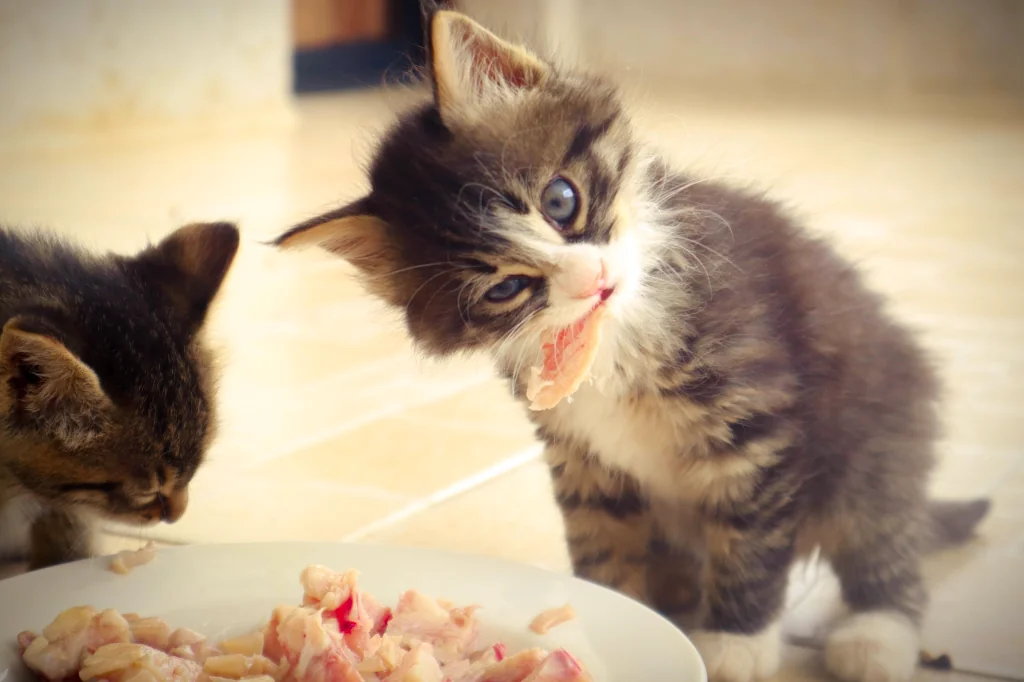
Why Is Protein Important in Your Cat’s Diet?
Protein, for your cat, is like the fuel in an engine.
It powers their metabolism, supports growth, maintains lean body mass, and is essential for repairing cells and tissues.
As carnivores, cats need a high amount of dietary protein to thrive. Unlike us or dogs, cats use protein as their primary energy source. They have unique metabolic pathways adapted to break down protein efficiently, even in rest.
Moreover, it’s crucial for maintaining a healthy immune system. Without enough protein, your cat can face growth stunting, muscle loss, and a compromised immune system.
What Specific Proteins Do Cats Need?
When it comes to protein, all are not created equal, especially for your furry little carnivore. They need animal-based proteins that provide all essential amino acids, the building blocks of protein.
The most critical is taurine, found abundantly in muscle meat, heart, and liver. A deficiency in taurine can lead to heart problems and even blindness.
Arginine, another essential amino acid, plays a crucial role in removing waste products from your cat’s body. Then there are others like methionine, cysteine, and tyrosine, crucial for your cat’s skin, coat, and overall health.
So next time you’re reading the ingredient list on your cat food can, lookout for these names. It’s not just about protein; it’s about the right kind of protein.
How Much Protein Should You Give to Your Cat?
The right quantity of protein for your cat is as essential as the quality. But determining the exact amount can be tricky because it depends on factors like their age, activity level, and health condition.
Kittens and pregnant or lactating cats require more protein, while senior cats need high-quality protein but in moderate amounts. As a starting point, a general rule of thumb suggests adult cats need at least 2 grams of protein per pound of body weight each day.
Active cats, especially those who spend time outdoors, may need more protein than indoor cats to sustain their energy.
Adjustments should also be considered if your cat is overweight or underweight. For instance, an overweight cat may still require a high-protein diet, but with controlled portions to maintain a balanced caloric intake. Conversely, an underweight cat may need increased servings of a high-protein diet to help gain healthy weight, under the guidance of a vet.
Here’s a table of typical suggestions of protein needs for cats in different life stages and conditions:
| Life Stage | Protein Needs |
| Kittens | High |
| Adult Cats | Moderate-High |
| Senior Cats | Moderate |
| Pregnant/Lactating Cats | Very High |
| Active, Outdoor Cats | High |
| Overweight Cats | High, but controlled portions |
| Underweight Cats | High, possibly increased servings |
Overall, maintaining a balanced diet is crucial, encompassing the correct proportions of protein, fat, and carbohydrates, along with a mindful inclusion of essential vitamins and minerals for enhanced nutritional value.
However, remember that each cat is unique. Consulting with your vet can provide personalized guidance on your cat’s protein requirements.
Related: Selecting Dry Cat Food
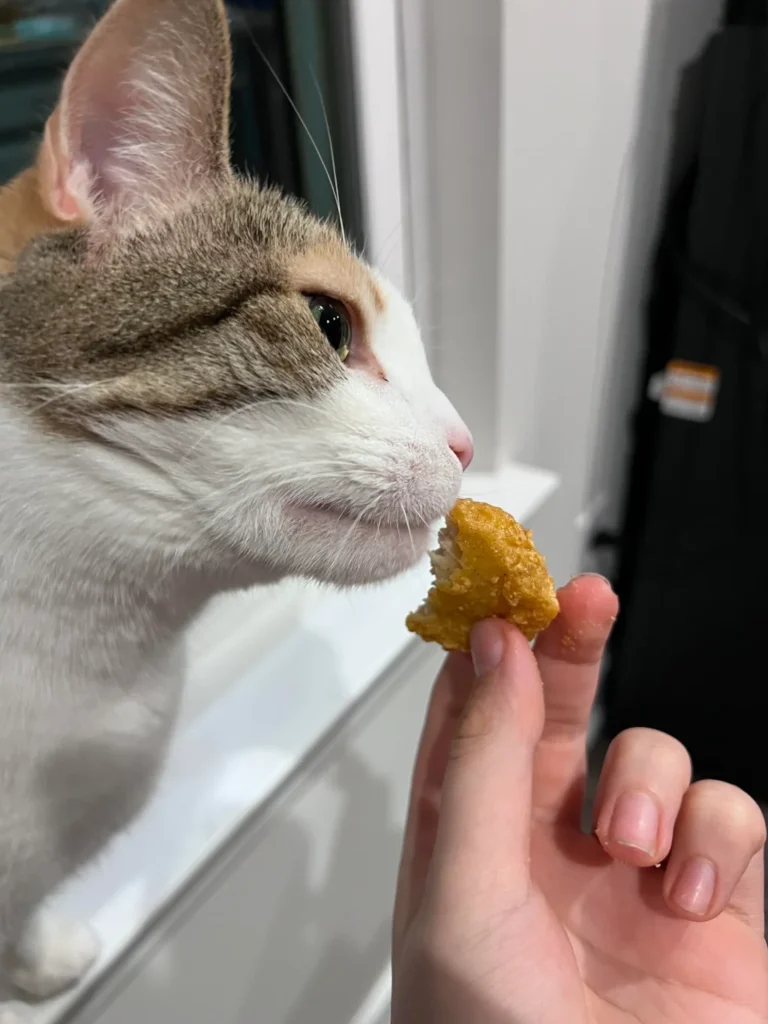
Can You Give Your Cat Too Much Protein?
Overdoing protein for cats is not typically a concern, as they are naturally high-protein diet consumers.
But it’s worth noting that too much of anything isn’t always good. Excess protein can put a strain on your cat’s kidneys over time, especially if they have an underlying kidney condition. Plus, if the cat’s diet is exceedingly protein-heavy, they may not get enough of other essential nutrients.
A balanced diet is key, where protein, fat, and carbohydrates are all present in the right proportions. When in doubt, it’s always wise to seek a vet’s advice.
Do Indoor Cats Still Need Lots of Protein?
Absolutely! Indoor cats may lead a more sedentary lifestyle compared to their outdoor counterparts, but their protein needs remain high.
Remember, cats use protein as their primary energy source and to maintain their body functions. Even if your cat isn’t chasing birds outside, their body is constantly working—growing cells, repairing tissues, fighting off germs—and that requires protein.
However, because they burn fewer calories, indoor cats need fewer overall calories to prevent weight gain. This is where high-quality, protein-rich food comes in handy. It gives them the needed protein without excess calories. It’s all about balance and quality.
Might be interested in: Raw Cat Food Pros & Cons
Decoding Protein Content in Commercial Cat Foods
Deciphering the protein content in commercial cat food can be a bit tricky, but it’s a vital skill for any cat owner.
Look for the ‘crude protein’ listed in the guaranteed analysis on the product’s label – this will give you the minimum amount of protein in the product.
But it’s not just about quantity; the quality of protein matters too. Look for named animal proteins as the first ingredient, like chicken, turkey, or beef, which are high-quality and easily digestible for cats.
Beware of ‘meal,’ ‘by-product,’ or ‘animal digest,’ as they are not as beneficial as the whole protein source. Brands that are transparent about their ingredients and sourcing usually offer higher-quality protein.
It’s important to remember that the most expensive food isn’t necessarily the best, and vice versa. Quality matters more than price, and it’s entirely possible to find reasonably priced cat food with excellent protein sources.
For instance, Purina ONE Indoor Advantage Adult Cat Food is a fantastic choice, providing real turkey as the primary source of protein and various essential nutrients. On the other hand, if you’re looking for a premium option, you might want to consider Hill’s Science Diet Indoor Dry Cat Food which boasts a balanced recipe with lean proteins.
Both of these are excellent options for indoor cats, but if you want a perfect fit for your feline, talk to your vet and keep educating yourself on what your furball needs to thrive. There’s a lot out there, and we’ve got your covered.
FAQs
Are some proteins better than others for cats?
Cats benefit most from animal-based proteins, such as chicken, turkey, fish, and beef, as they provide the essential amino acids cats require. Plant-based proteins do not offer the full range of necessary amino acids.
How can I tell if my cat’s diet is low on protein?
A cat on a low-protein diet may exhibit symptoms like loss of appetite, weight loss, lethargy, poor coat health, and a weakened immune system. If you observe these signs, it’s advisable to consult a vet.
Can a cat survive on a vegetarian or vegan diet?
Cats are obligate carnivores, meaning their natural diet is primarily meat. They require certain nutrients, like the amino acid taurine, that are only found in animal-based proteins. Therefore, a vegetarian or vegan diet is not recommended for cats without careful supplementation and veterinary supervision.
Alex, a passionate animal lover, has experience in training and understanding animal behavior. As a proud pet parent to two dogs and three cats, he founded AnimalReport.net to share insights from animal experts and expand his knowledge of the animal kingdom.

